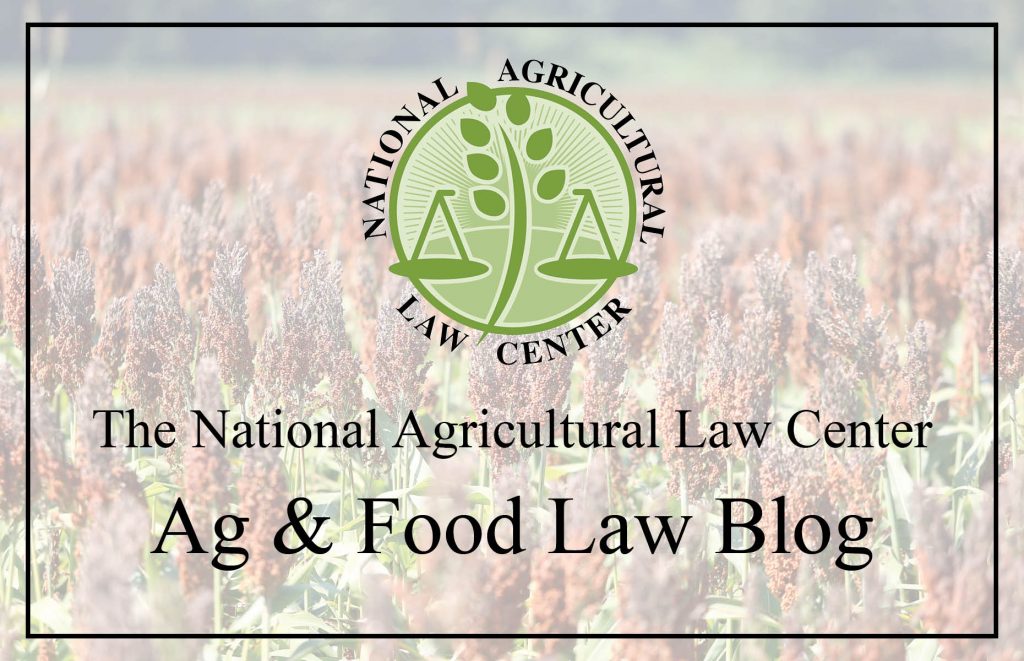Another month has come and gone and National Ag Law Center staff have been publishing factsheets, webinars, blog posts and more in an effort to remotely connect stakeholders with trusted research and information in agricultural and food law. Outlined below are resources and outreach efforts from the Center from the month of May.
Publications
Meat Processing Laws in the United States: Whether overseen by the federal or state government, each facility that slaughters and processes livestock must meet requirements regarding sanitation, building requirements and more. However, these requirements can vary from state to state, and depend on the type of facility. In order to manage risk appropriately, it is important to obtain correct information before finalizing plans for a new facility. Legal researchers at the National Agricultural Law Center have created a multifaceted resource for those interested in opening a meat slaughtering and processing facility. This publication provides relevant state statutory language, as well as contact information to offices of appropriate authorities on a state-by-state basis
Unmanned Aerial Vehicle (“UAV”) Laws: Typical Provisions: As technology in the field of unmanned aerial vehicles has evolved the agricultural industry has benefited from the usage of the new technology. Along with potential benefits, the new technology also introduced new concerns surrounding issues such as privacy. The purpose of this compilation is to provide potential UAV operators, policy makers and educators with a means to rapidly research each state’s UAV laws.
Force Majeure and Other Contractual Defenses during the COVID-19 Pandemic: A contract, in short, is a legally binding promise. However, in certain circumstances, parties to contracts may be able to avoid those obligations when unexpected events happen that make performance extremely difficult or impossible. Only major, unforeseen events may trigger the possible defenses to a breach of contract that may release a party from future obligations without legal consequence. This factsheet is meant to provide a broad overview of these types of potential defenses, especially in light of the COVID-19 public health emergency.
Webinars
Mediation as a Problem Solving Tool for Farmers and Agribusiness: Agricultural producers face many unique challenges when trying to balance difficult decisions and important relationships. However, when stuck between a rock and a hard place, agricultural mediation can offer assistance. Agricultural mediation provides producers with a trained, impartial third party equipped to assist in the problem-solving required for agribusinesses, while maintaining relationships with employees, neighbors or business partners. This webinar provided an overview of agricultural mediation, its benefits, what to expect from a mediator, and much more. A recording can be found here.
Blog posts:
- Cleanup of Abandoned Oilfield Locations: Who is Responsible?
- WOTUS Update: Navigable Waters Rule Faces Backlash
- Two Cases Dismissed and One Advances in ESA Dispute
- Assistance Available for Producers Facing Depopulation
Outreach
- The Center hosted its “Early Bird Special” Bonus CLE for the 7th Annual Mid-South Agricultural and Environmental Law Conference on May 19. This online CLE, offered to participants who registered by May 18, covered an agricultural law update and current legal issues for industrial hemp production.
- Senior Staff Attorney Rusty Rumley was featured on Arkansas Farm Bureau’s AgCast podcast, where he discussed agricultural law issues related to the COVID-19 pandemic. This episode of the podcast can be found here.
- Center Director Harrison Pittman was also featured on an episode of AgCast this month, where he discussed the executive order to keep meat packing plants open. This episode of the podcast can be found here.
- Harrison Pittman was also a guest on the University of Illinois FarmDoc Daily webinar series, where he discussed the COVID-19 pandemic’s impact on several issues in agriculture. A recording of this webinar can be found here.
